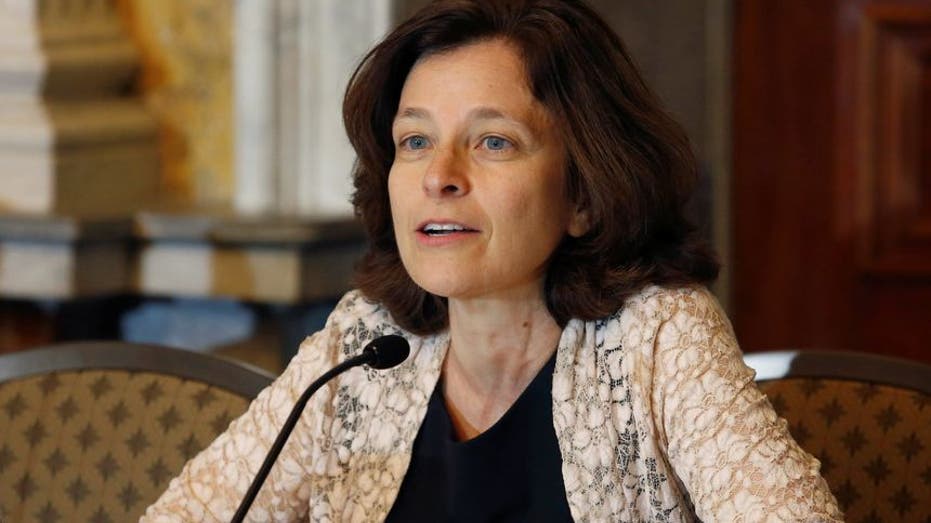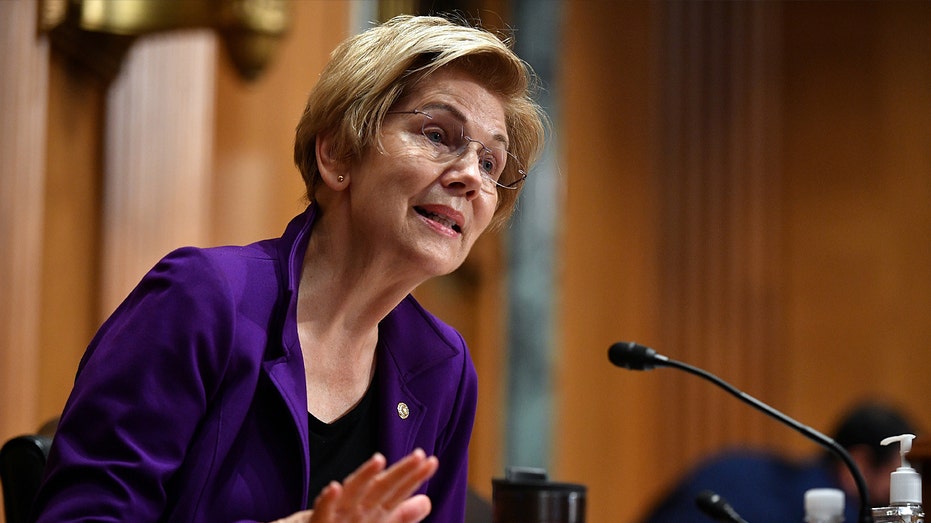Biden eyes Sarah Raskin as top Fed banking regulator
Raskin is acceptable to progressives like Sen. Elizabeth Warren, D-Mass.
TIFIN plans to transform the world of wealth
TIFIN founder and CEO Vinay Nair discusses the future of wealth management on 'Making Money.'
President Biden is considering Sarah Bloom Raskin for a top role at the Federal Reserve as part of a slate of three nominees for central bank board seats, according to people familiar with the matter.
The administration is eyeing Ms. Raskin, a former Fed governor and former Treasury Department official, to become the central bank’s vice chairwoman of supervision, the government’s most influential overseer of the American banking system, the people said.
Mr. Biden is also considering two economists for other Fed board seats that will soon be vacant: Lisa Cook, a professor of economics and international relations at Michigan State University; and Philip Jefferson, a professor and administrator at Davidson College in North Carolina.
Ms. Raskin’s nomination could mollify progressive Democrats, some of whom opposed Mr. Biden’s decision in November to offer a second term to Fed Chairman Jerome Powell, a Republican first chosen for the top job by former President Donald Trump. They have called for the Fed to take a tougher stance in regulating big banks and a bolder approach in addressing financial risks posed by climate change.

Sarah Bloom Raskin has served as a Fed governor, Treasury official and Maryland’s commissioner of financial regulation (Photo: Yuri Gripas/Reuters) (Reuters)
STOCKS IN 2022 FACE BUMPY RIDE AS S&P SITS AT RECORD
In a speech in September 2009, Ms. Raskin blamed the financial crisis on "a deregulatory fervor that marginalized the interests of many" and said the downturn had been "brought upon us through a combination of greed, weak regulation and weak enforcement."
While serving as a Fed governor from 2010 to 2014, Ms. Raskin was deeply involved in behind-the-scenes work to write rules implementing the 2010 Dodd-Frank financial-regulatory overhaul.
Since leaving the government, Ms. Raskin has spoken out on the need for the Fed and other federal financial regulators to more proactively address growing threats from climate-related events such as natural disasters and wildfires.
"There is opportunity in pre-emptive, early and bold actions by federal economic policy makers looking to avoid catastrophe," Ms. Raskin wrote in the foreword of a report last year from the Ceres Accelerator for Sustainable Markets, a climate advocacy group.
Sen. Elizabeth Warren (D., Mass.) has signaled to the White House she would support either Ms. Raskin or Richard Cordray, the Consumer Financial Protection Bureau’s first confirmed director, who also has been under consideration for the Fed’s banking-regulator post.

WASHINGTON, DC - OCTOBER 19: Senator Elizabeth Warren, D-MA, speaks during a Senate Finance Committee on the nomination of Chris Magnus to be the next US Customs and Border Protection commissioner in the Dirksen Senate Office Building on Capitol Hill (Photo by Mandel Ngan-Pool/Getty Images / Getty Images)
The potential nominations of Ms. Cook and Mr. Jefferson, both Black economists, would help Mr. Biden achieve his promise to improve diversity atop the central bank, which in its 108-year history has had only three Black board members, all of them men. The most recent was former Fed Vice Chairman Roger Ferguson, who left the board in 2006.
The Fed’s seven-seat board of governors has one vacancy with two more looming. Governor Randal Quarles has said he would resign by the end of the month, and the term of Vice Chairman Richard Clarida ends next month. The White House’s slate of nominees for these three seats could still change before an official announcement is made, as soon as early January.
With a closely divided Senate, Mr. Biden needs either universal support of Democrats to confirm his nominees or support from some Republicans to overcome holdouts from his own party.
After serving as a Fed governor, Ms. Raskin, an attorney, served in the Obama administration as deputy secretary at the Treasury Department from 2014 to 2017. She was confirmed by a voice vote in the Senate for both posts. Before that, she served as Maryland’s state commissioner of financial regulation. She currently is a law professor at Duke University and is married to Rep. Jamie Raskin (D., Md.).
At the Treasury, Ms. Raskin led efforts to address the financial stability risks of cybersecurity. At the Fed, she maintained a low profile on monetary policy and backed then-Chairman Ben Bernanke’s effort to provide economic stimulus by purchasing government bonds.
More recently, in a New York Times opinion article in May 2020, Ms. Raskin was critical of broad-based emergency-lending backstops enacted by the Treasury and Fed to assist businesses during the pandemic because she believed they should have taken steps to prevent lending to oil-and-gas concerns.

FILE - This May 4, 2021, file photo shows the Federal Reserve building in Washington. Federal Reserve officials agreed at their last meeting that if the economy continued to improve, they could start reducing their monthly bond purchases as soon as n (Associated Press)
"The decisions the Fed makes on our behalf should build toward a stronger economy with more jobs in innovative industries—not prop up and enrich dying ones," she wrote.
Texas Sen. Ted Cruz, a Republican, on Tuesday took to Twitter to criticize Ms. Raskin’s potential nomination, saying she "advocated cutting off capital for energy & destroying millions of US jobs."
Progressive activists praised all three potential Fed board candidates and encouraged Mr. Biden to quickly nominate them, warning that delays filling these slots have crimped the White House’s agenda. "We need them there now," said Dennis Kelleher, chief executive at Better Markets, a group that advocates for stricter Wall Street oversight, in a tweet.
JOB OPENINGS, CONSUMER PRICES, COSTCO AND GAMESTOP EARNINGS TOP WEEK AHEAD
Mr. Jefferson, vice president for academic affairs and dean of faculty at Davidson College in North Carolina, has been an academic for nearly all the time since 1990, when he earned his Ph.D. in economics, specializing in monetary economics and finance, at the University of Virginia. He was an economics professor at Swarthmore College from 1997 to 2019 and spent a year as a staff economist in the division of monetary affairs at the Fed board in the 1990s.
His research has focused on labor markets and poverty, including a 2008 paper that examines economic volatility faced by African-American families and female-headed households and its relationship to declining volatility in economic output. In 2005, he analyzed the costs and benefits of policies that promote a "high-pressure economy" to spur tighter labor markets, arguing that the latter outweighed the former.
In a 2018 interview with a publication of the Minneapolis Fed, Mr. Jefferson discussed the challenges of being a member of a minority group in the economics field. "I have never been in an economics department with another African-American economist. Never," he said. "My passion and enjoyment of learning new things, of writing and having a voice in different conversations, compensates me for the absence of colleagues who look like me."

President Joe Biden speaks during a virtual meeting with the House Democratic caucus in the South Court Auditorium of the Eisenhower Executive Office Building, on the White House complex, Wednesday, March 3, 2021, in Washington. (AP Photo/Alex Brando
Ms. Cook formerly served as a senior economist on the White House Council of Economic Advisers in the Obama administration. She has a Ph.D. in economics from the University of California, Berkeley, and bachelors degrees from Spelman College and Oxford University.
She wrote her doctoral dissertation on the underdevelopment of Russia’s banking system after the collapse of the Soviet Union, a feature she attributed to weak property rights.
The project created the germ of what would become her best-known research: a paper exploring the effect of violence and terrorism against Black Americans on innovation between 1870 and 1940.
CLICK HERE TO READ MORE ON FOX BUSINESS
Ms. Cook expressed support for programs in Mr. Biden’s economic agenda during a recent Fed conference on gender and the economy. Asked on a Nov. 8 panel to identify three policies that would be most effective in addressing discrimination and lack of opportunity, Ms. Cook cited child-care and elder-care support, paid family leave and infrastructure. All are included in either the bipartisan infrastructure package that was enacted this year or in the social-spending and climate legislation that passed the House, but has stalled in the Senate.




















